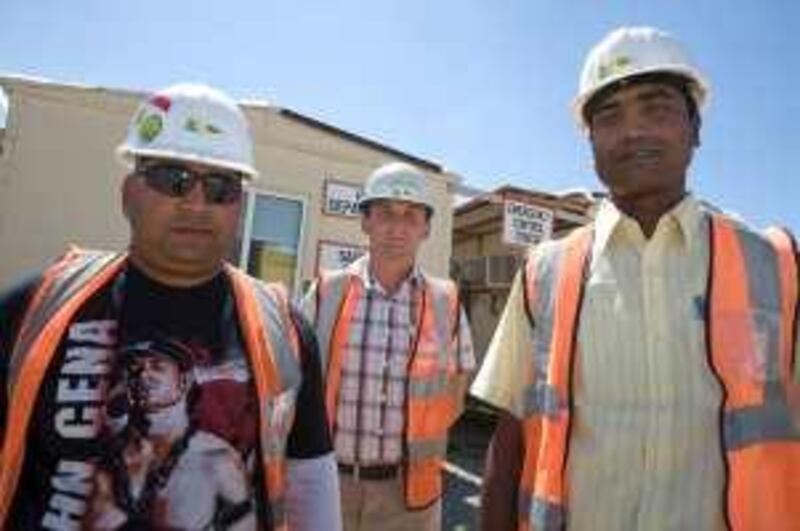ABU DHABI // Kashmir Lal knows that the quickest way to get rough and ready construction workers to listen to his message is to tug on their heartstrings. "When you damage your hands or legs, then your family is affected," said Mr Lal, a 38-year-old steel fixer from India, reciting some of the wisdom he plans to impart to workers at his company, Murray & Roberts.
"Ultimately, they will suffer because you were not careful about protecting yourself on the site. The loss is ours if we don't care about the safety of the site we work in." Mr Lal is one of five employees at his company taking part in the Construction Worker Champions of the UAE, a pilot project to improve worker safety. For the next six months, he and 24 other "worker champions" chosen by their bosses at five companies across the country will conduct weekly in-house safety inspections and give their fellow workers daily briefings on things such as first aid and how to make sure they do not fall when working high up.
Falls from height remain the most common cause of workplace fatalities and one of the main causes of major injury, according to BuildSafe UAE, the not-for-profit organisation overseeing the programme. In 2008, the organisation recorded the deaths of 18 construction workers among 18 major contractors with nearly 300,000 employees. Six of the workers fell to their deaths. The report also listed 651 lost-time worksite injuries.
Thomas McGuire, the director of health, safety and environment training with Al Habtoor Group, another of the companies taking part, said: "We wanted to introduce a system where safety reporting was showing compliance on sites instead of just recording accidents on site. "For now we are starting with the workers themselves. It is now their job to explain to fellow workers what it means to be safe."
Five workers from various trades - from plumbing and masonry to carpentry - are matched with a mentor, a safety officer who will teach them how to gather information against a set of safety criteria. "This is part of their development," said Elias McGrath, the group administrator for BuildSafe UAE. "It is giving them a voice in the industry." The project was the brainchild of Jaana Quaintance, a senior project manager with Impactt Limited, a labour standards consultancy. After receiving feedback from the industry at the end of last summer, she was left with an important question: what can be done to make labourers care about safety?
"We realised engaging with workers is key. And the impact has to be there." Ms Quaintance has worked with labourers in other countries, including India and China, and refers to them as "key stakeholders". "If you make them feel part of an organisation, then the company benefits." The idea was pitched in November. The nominated workers, who have no formal training in safety, started orientation in January at Al Habtoor's training centre in Dubai.
They received general safety training including hazard identification and how to do a "toolbox talk", where they talk about safety in front of their co-workers. Data is collected every week and sent to BuildSafe. At the end of the project, the group hopes to use the data to better understand safety concerns on worksites. At the end of the first month, most of the safety managers involved said they had noticed small but significant improvements among the workers.
For example, more were voluntarily donning their safety hats and harnesses instead of having to be told to do so. If this project is successful, more companies from BuildSafe will be encouraged to take part in the next round. Getting workers from various nationalities and trade backgrounds to uniformly understand the safety message has been one of the challenges. "It is about gaining the common understanding," Mr McGuire said, "to make it readily understood."
@Email:sbhattacharya@thenational.ae






